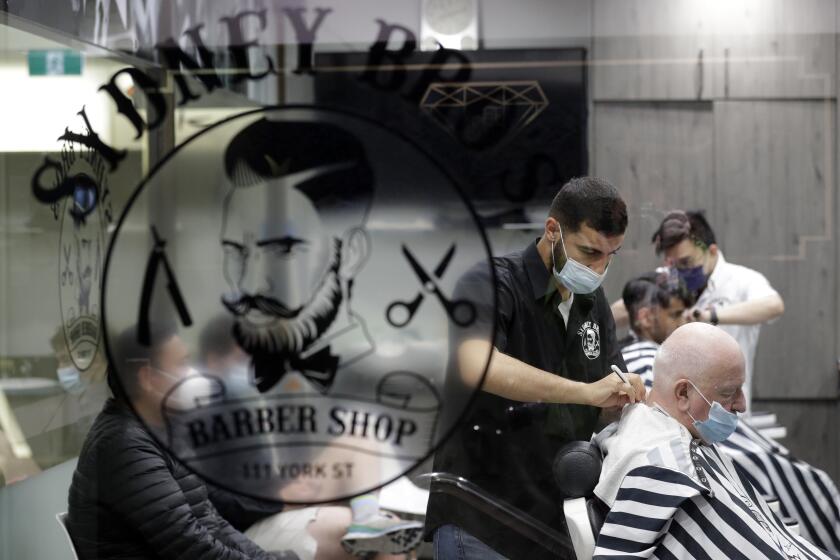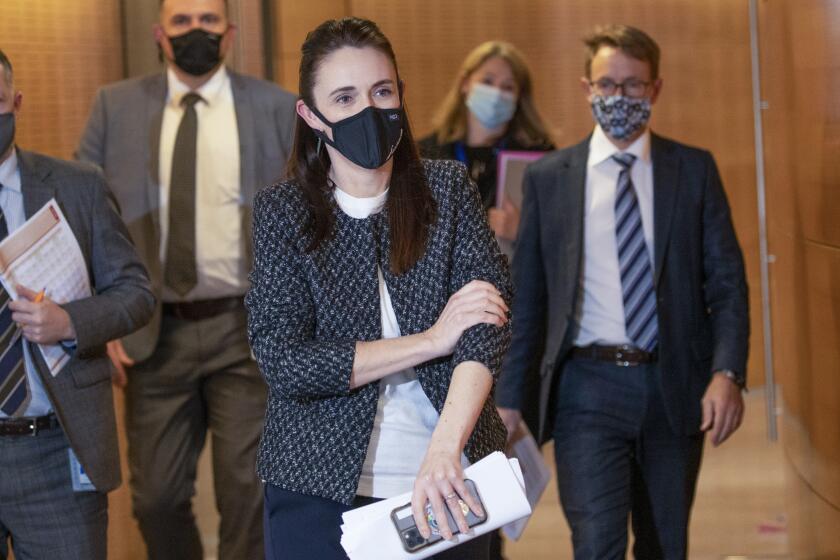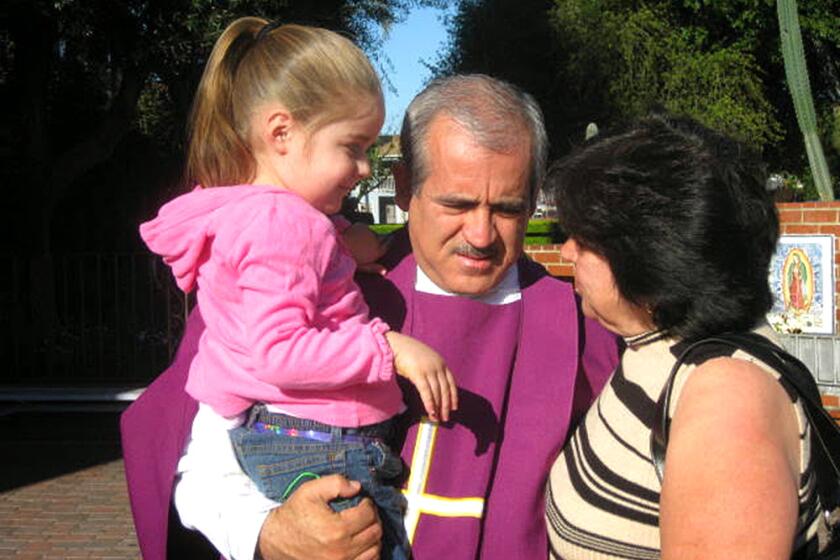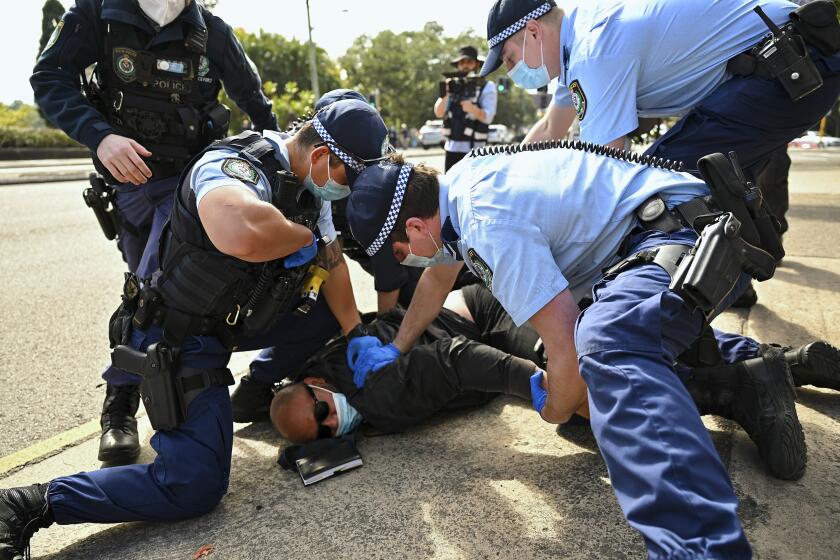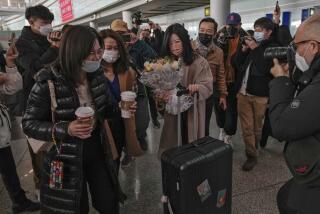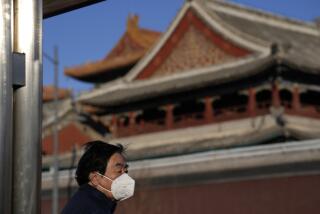Tearful reunions, tons of hugs: After 20-month travel ban, Australia reopens its borders
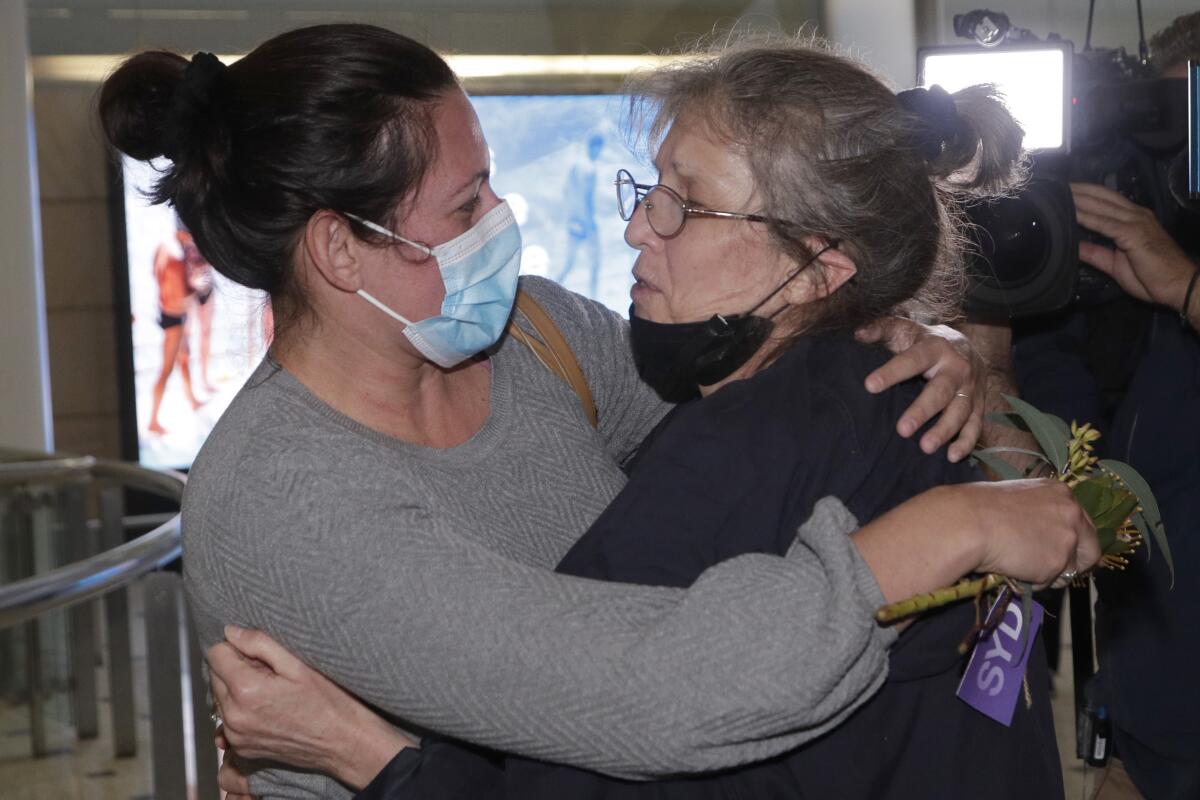
CANBERRA, Australia — Sydney’s international airport came alive with tears, embraces and laughter Monday as Australia’s border opened for the first time in 20 months, with some arriving travelers tearing away mandatory masks to see faces of loved ones they’ve been separated from for so long.
“Just being able to come home without having to go to quarantine is huge,” Carly Boyd, a passenger who had traveled from New York, told reporters at Sydney’s Kingsford-Smith Airport, where Peter Allen’s unofficial national anthem “I Still Call Australia Home” was playing.
“There’s a lot of people on that flight who have loved ones who are about to die or have people who died this week. So for them to be able to get off the plane and go see them straight away is pretty amazing,” Boyd added.
Australia is betting that vaccination rates are now high enough to mitigate the danger of allowing international visitors again after maintaining some of the lengthiest and strictest border controls anywhere during the COVID-19 pandemic.
Thailand, too, was reopening its border Monday. Fully vaccinated tourists arriving by air from 46 countries and territories no longer have to quarantine and can move freely. And local restrictions such as a curfew in some areas were being lifted.
Before the pandemic, Sydney was Australia’s busiest international airport but had been almost deserted for months.
Hair salons, gyms, cafes and bars in Australia’s biggest city open after more than 100 days of lockdown but only to those inoculated against COVID-19.
The new freedoms also mean that fully vaccinated Australian permanent residents and citizens can leave the country for any reason without asking the government for an exemption from a travel ban that has trapped most at home since March 25, 2020.
Incoming vaccinated Australians are able to come home without quarantining in a hotel for two weeks. The cap on hotel quarantine numbers had been a major obstacle for thousands of Australians stranded overseas. That cap now applies only to unvaccinated travelers.
Sydney was the first Australian airport to announce it would reopen Monday because New South Wales was the first state to reach the required benchmark of having 80% of residents 16 and older fully inoculated against COVID-19. Melbourne and the national capital, Canberra, also opened Monday after Victoria state and the Australian Capital Territory, respectively, achieved the vaccination benchmark.
Sydney had 16 scheduled inbound international flights Monday and 14 outbound. Melbourne, Australia’s second-largest city, had five scheduled in and five out. Canberra had none.
New Zealand’s government has acknowledged what most other countries did long ago: It cannot completely and permanently rid itself of the coronavirus.
The first regular international passenger flight to land in Australia was a Singapore Airlines flight from Singapore that landed before 6 a.m. local time, followed by a Qantas Airways flight that had flown 15 hours from Los Angeles.
Qantas customer service manager Paul Wason said landing in Sydney was a “huge day” for passengers and crew alike.
“Very much mixed emotions, great emotions, lots of happiness, lots of sadness, lots of excitement as well,” Wason said.
An Australian who lives in San Francisco, who identified himself only as Jeremy, said he had been trying to fly back to Sydney with his wife and baby daughter since July. They had been prevented at short notice four times from flying, twice because flights were delayed and twice because quarantine caps had been reduced in response to the COVID-19 Delta variant taking hold in Sydney in June.
Francisco Valdovinos was a beloved priest in the Coachella Valley. His death from COVID-19 spurred vaccinations.
“At every moment until we were sitting on the plane, it just felt like something was going to go wrong, and I’m so glad that it all worked out and that we’re here,” Jeremy told the Australian Broadcasting Corp. at Sydney’s airport.
Initially, only Australian permanent residents and citizens will be free to enter the country. Fully vaccinated foreigners traveling on skilled worker and student visas will be given priority over international tourists.
But the government now expects Australia will welcome back international tourists to some degree before the year ends.
Some of Australia’s 1.6 million temporary residents feel left out of Australia’s reopening plan and unsure of their travel status.
News Alerts
Get breaking news, investigations, analysis and more signature journalism from the Los Angeles Times in your inbox.
You may occasionally receive promotional content from the Los Angeles Times.
“I think that it’s vague around the definition of residents and where we get to be involved in that national plan,” said Jennifer Clayburn, an American living with her family in Melbourne since January last year on a short-term visa for skilled workers.
“We have been doing it tough, alongside all Australians. We too want to be around the table at Christmas with our family, but we do not want to be summarily locked out of Australia upon return,” she said.
Graham Turner, chief executive of Australia’s largest travel agency, Flight Center, said international travel to Australia was not expected to return to normal until mid-2024.
“It will come back quickly for those people who really want to travel. Initially it’s the friends and relatives — people who haven’t seen each other for a long time,” Turner said.
More than 250 people have been arrested while protesting coronavirus lockdowns in the country and many faced fines for defying health orders.
“That will be the first wave. And the traveling wave will tend to come a little bit later, once people see what the scenario is like,” Turner added.
While Australians are now free to travel overseas, four Australian states and one territory still have restrictions on crossing state lines.
Australian Ethen Carter, who landed at Sydney’s airport from Los Angeles, expressed his frustration at having to apply for permission to visit his dying mother in Western Australia state.
Western Australia has little COVID-19 and the nation’s lowest level of vaccinations, with only 63% of the target population fully vaccinated.
A TV and film industry is booming in Australia’s coastal town of Byron Bay, and promoters are banking on expansion, thanks to its A-list celebrities.
Carter pleaded through the media to Western Australia Premier Mark McGowan to let him in. McGowan has said the state border will not open this year.
“Mark, think of the people that are suffering, like, mentally to see their family. That’s also a health issue. And we know we’ve got to protect people’s lives, but you’ve got to bring families together again — you have to,” Carter said.
McGowan said his government would consider allowing Carter to enter the state if he applied for an exemption.
“These situations are very sad and very difficult, and we’ve seen much of this over the course over the last two years,” McGowan said.
More to Read
Sign up for Essential California
The most important California stories and recommendations in your inbox every morning.
You may occasionally receive promotional content from the Los Angeles Times.
